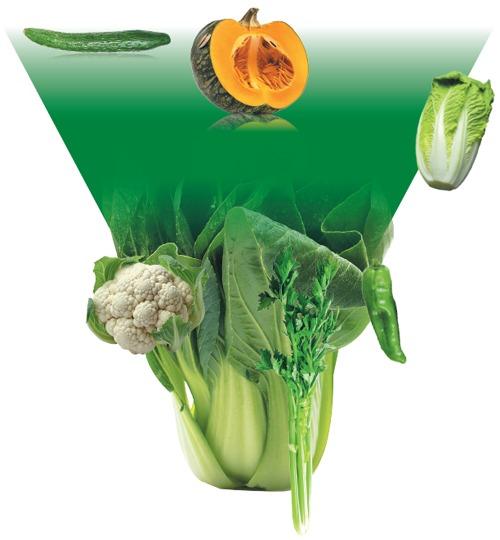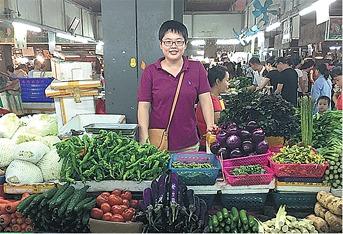
Whenever Zhong Shuru hears about an interesting farmers' market, she is tempted to visit it.
For example, Zhong, who is in her 30s and lives in Zhuhai, Guangdong province, recently took a three-hour flight to the northern city of Tianjin just to go to Zhongshanlu Farmers' Market.
I was intrigued when I heard this outlet had been launched by a man who has been committed to the food market business for the past three decades. The design is based on distinctive elements such as sculptures and paintings from food markets the owner visited. He even placed his primary school's motto at the entrance to the market, giving the venture a distinctive personal touch.
Zhong Shuru
"I was intrigued when I heard this outlet had been launched by a man who has been committed to the food market business for the past three decades," she said.
Zhong's trip to Tianjin last month lived up to her expectations.
In addition to tasting distinctive local food at the market, she spoke to the owner and vendors, and gained a good impression of the venture.
"The design is based on distinctive elements such as sculptures and paintings from food markets the owner visited," Zhong said.
She was also impressed by the owner's efforts to launch a museum featuring the history of the local food market.
"He even placed his primary school's motto at the entrance to the market, giving the venture a distinctive personal touch," she said.
Zhong, who has visited hundreds of farmers' markets at home and abroad, added, "During my childhood, my mother set up a temporary stall at a food market to cover family expenses. I loved spending time there."
She first became aware of the appeal of Chinese farmers' markets when she studied anthropology in the United States more than a decade ago.
"People in the US mostly drove to supermarkets to stock up on food for a whole week — totally different from their counterparts in China," said Zhong, who has since focused her attention on Chinese farmers' markets.
"These outlets reflect distinctive local food culture and lifestyles, and are great places to start exploring a city," she said.
"For example, you can see a wide range of mushrooms from Yunnan province and large quantities of fresh fruit from Shandong province. You can also gain an appreciation of Beijingers' preference for meat, while Guangdong consumers favor herbs and offal," she added.
The way in which a farmers' market is organized also provides travelers with interesting information.
"You are more likely to see open-air markets in the north of China, where there is less expectation of rain than in the south," Zhong said.
He Minyan, like Zhong, discovered the attractions of farmers' markets more than 10 years ago when she often took her son traveling across the country.
"He was only a few years old. As we were often on the road for days, I had to go to various farmers' markets whenever I could to prepare food for him," said He, who comes from Guangzhou, capital of Guangdong.
She experienced stark contrasts in the farmers' markets she came across.
"I remember the giant steamed buns at a food market in Harbin (capital of Heilongjiang province) in 2012. They were four to five times as big as the buns we had at home," she said.
The pine nuts scattered across the floor at a farmers' market in Inner Mongolia autonomous region also surprised He.
"It was autumn, and dozens of different types of pine nuts, which are a luxury snack in Guangdong, lay on the floor," she said.
 Zhong Shuru visits a food market in southern China. (PHOTO PROVIDED TO CHINA DAILY)
Zhong Shuru visits a food market in southern China. (PHOTO PROVIDED TO CHINA DAILY)
Classes launched
In the following years, He increasingly noticed the valuable mine of information to be found in these markets.
In 2018, she launched classes on regional differences and culture seen from the perspective of farmers' markets for students from primary to high school.
In addition to introducing the evolving history of the outlets, He has taken students to such markets in Chengdu, capital of Sichuan province, Hong Kong, and Shenzhen, Guangdong, to show them how the produce is arranged.
She plans to compile information on the markets for publication to enable more people to appreciate the attractions of these ventures.
An increasing number of Chinese travelers are experiencing the delights of farmers' markets.
Huang Linwu, who comes from Yunnan, often plans to allocate time to visit a farmers' market whenever he goes to a city for business or leisure. "Although logistics services are now well developed, and all farmers' markets nationwide may appear to offer a wide variety of products, there are still differences," Huang said.
For example, he found that scallions in Shandong's food markets were tastier than those from Yunnan. "Ours are a little spicy, while those from Shandong are sweet," he said.
He traces his love for food markets to his college years.
During the May Day holiday from April 29 to May 3, Badaju Food Market in an old city block in Zibo, Shandong, received more than 190,000 visitors in a single day, the market administration reported. Travelers lined up to get barbecue and other local snacks
"In those days, whenever I had some money, I loved backpacking and traveling. Food markets were the first places I visited, as I got to see what the locals ate," Huang said.
Over the years, he has developed the view that food markets provide a valuable immersive travel experience. "Witnessing the lives of locals (at a food market) is the most beautiful part of a journey," he said.
Many food markets across the country have emerged as popular tourism destinations.
During the May Day holiday from April 29 to May 3, Badaju Food Market in an old city block in Zibo, Shandong, received more than 190,000 visitors in a single day, the market administration reported. Travelers lined up to get barbecue and other local snacks.
Since the barbecue craze swept Zibo earlier this year, the number of visitors to the market has grown more than tenfold, data from the Badaju Market Administration show.
The number of single-day visitors to Shuangta Food Market in Suzhou, Jiangsu province, has reached a high of 200,000 since renovation work was completed in late 2019.
Many young visitors are attracted by the venue's artistic typographical designs, elements of nostalgia, and crops symbolizing harvest time.
Yang Yanfeng, director of Beijing Union University's online tourism research center, said a food market is one of the liveliest places in a city. It represents local cultural heritage and the way of life, especially at the grassroots level.
"Tourism is becoming increasingly personalized and interest-oriented, and I believe that certain people are eager to visit attractions such as farmers' markets," Yang said.
He is impressed by Caoxian Fair in Caoxian county, Shandong, where visitors traditionally sample mutton soup.
ALSO READ: Northeast ethnic barbecue culture, flavor embraced across China
 College students ask a vendor questions during a learning trip to a food market in Puning city, Guangdong province. (PHOTO PROVIDED TO CHINA DAILY)
College students ask a vendor questions during a learning trip to a food market in Puning city, Guangdong province. (PHOTO PROVIDED TO CHINA DAILY)
Gourmet food
In Kunming, capital of Yunnan, Zhuanxin Farmers' Market boasts groups of stalls selling gourmet food and novelty items.
Yang said, "There's even a local saying that goes, 'If you don't know what to eat, go to Zhuanxin.'"
He believes that as long as a farmers' market appeals to visitors, it meets the requirements of being a tourist resource, and can be developed into a tourist attraction.
"If a city farmers' market has potential, it can be considered for inclusion on tourism routes," he said.
Yang suggests that travel agencies allocate time for tourists to explore popular and distinctive farmers' markets, and that local authorities introduce these markets in their tourism promotions, such as travel brochures and maps, to provide visitors with more options to enjoy a destination.
He also feels that local governments should develop infrastructure at farmers' markets with tourism potential and set up visitor-friendly signs and hotline numbers.
Numerous farmers' market operators have looked at the tourism potential of these venues to devise renovation plans.
Zhu Rong, who helped design the Shuangta market in Suzhou, allocated space for cafes and pubs.
"The market is adjacent to the Pingjiang historic block, and most tourists will head south to the market after touring the block, creating more opportunities for social interaction," Zhu said.
The market operators will focus on highlighting attractions in the area surrounding the Shuangta market, and art performances, including local pingtan (storytelling and singing in the Suzhou dialect) and Kunqu Opera, will be staged in the neighborhood, Zhu said.
At Cuifang Farmers' Market, another well-known site in Suzhou, fire hydrants are adorned with cartoon stickers of fruit and vegetables, while the walls feature artworks, including images of a cat sitting on a wall.
Xu Xiong, who is in charge of operations at the market, said each stall owner wears an eye-catching customized apron. During weekends and holidays, the market attracts countless young visitors who chat and sip tea.
Zhong Shuru, who is an associate professor at Sun Yat-sen University's School of Tourism Management in Zhuhai, has become acutely aware of the rising popularity of food markets among young people in recent years.
"An increasing number of my students have shown an interest in these markets," Zhong said.
She attributes the rising popularity of farmers' markets to their displays of authentic local life.
"You can see locals going about their business, and experience culture and a slow-paced lifestyle, which are quite different from the attractions at conventional tourist attractions," Zhong said.
"Moreover, the snacks at these markets are more likely to truly represent local flavors," she added.
READ MORE: Skills: People display talent, dedication
As an expert on farmers' markets, Zhong said they have experienced transformative development.
"Many of the outlets now offer a clean environment and intelligent management. They are no longer dingy wet markets," she said.
As numerous farmers' markets are situated amid bustling businesses and convenient transportation services, Zhong said that more community services have emerged nearby, including canteens, day care centers and barber shops.
However, Zhong said market renovation should always be based on the practical needs of local residents, especially if these venues are revamped as tourist destinations.
Contact the writer at yangfeiyue@chinadaily.com.cn


